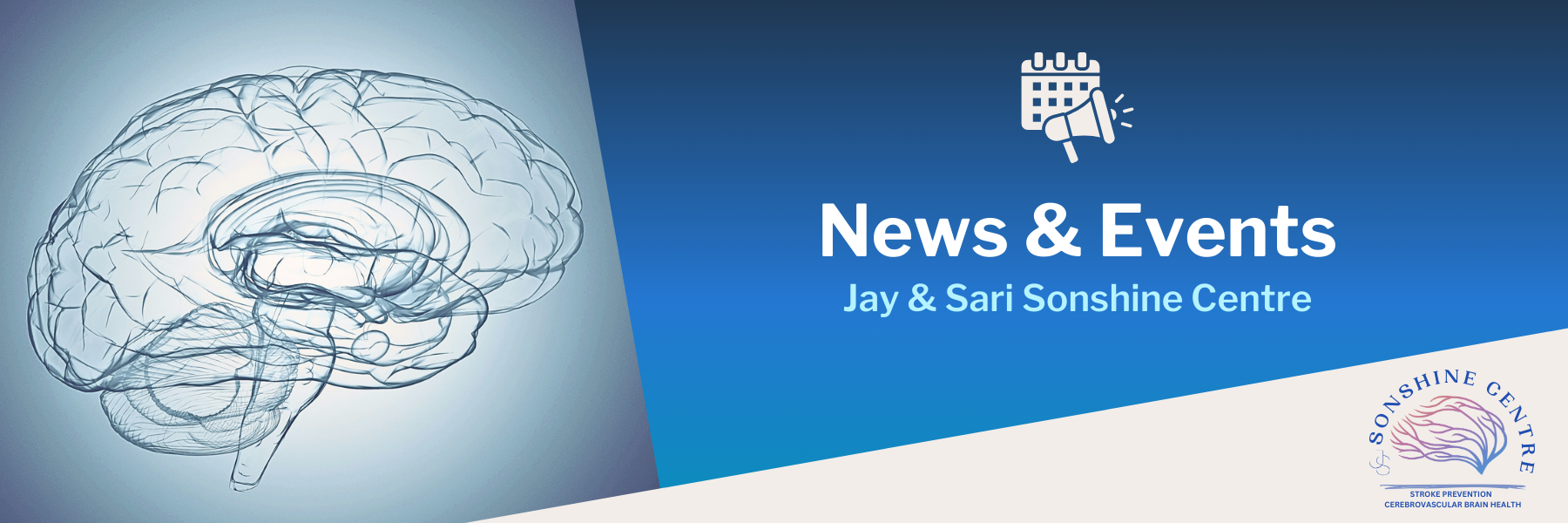
News Stories
The Jay & Sari Sonshine Centre Opens at Toronto Western Hospital & Krembil Brain Institute
The Very First Lifestyle Medicine-Focused Stroke Prevention and Brain Health Centre in Canada
October 8, 2024
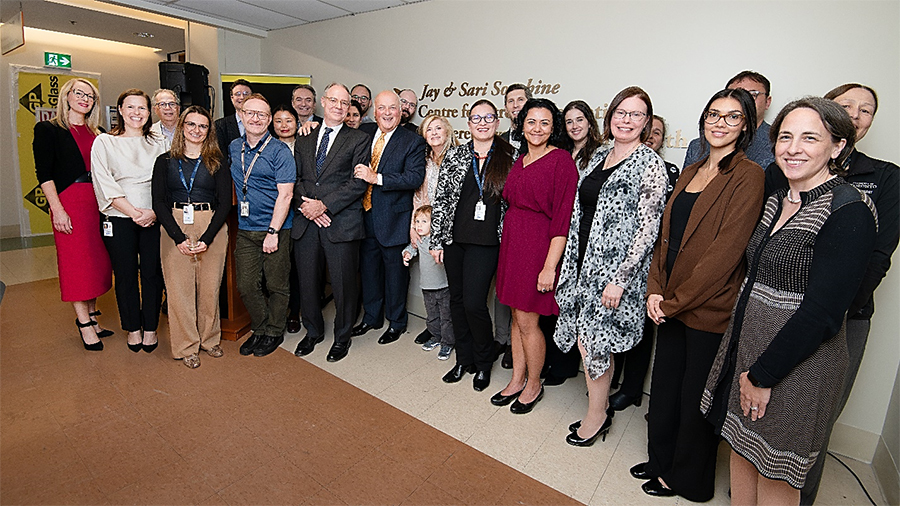 At the opening of the Jay & Sari Sonshine Centre for Stroke Prevention and Cerebrovascular Brain Health at Toronto Western Hospital, members of the Sonshine family were joined by Dr. Kevin Smith, President and CEO of UHN, members of UHN Foundation and staff from the centre. (Photo: Andrew Downs Photography)
At the opening of the Jay & Sari Sonshine Centre for Stroke Prevention and Cerebrovascular Brain Health at Toronto Western Hospital, members of the Sonshine family were joined by Dr. Kevin Smith, President and CEO of UHN, members of UHN Foundation and staff from the centre. (Photo: Andrew Downs Photography)
The Jay & Sari Sonshine Centre for Stroke Prevention and Cerebrovascular Brain Health officially opened at UHN's Toronto Western Hospital and Krembil Brain Institute (KBI).
The Sonshine Centre, dedicated to stroke prevention and cerebrovascular brain health through innovative clinical work, education and research, is the first in Canada to apply lifestyle medicine — an evidence-based medical discipline focused on the prevention and treatment of chronic conditions — as an innovative clinical service to support patients and their families.
"Having our name associated with such an incredible team of dedicated specialists and the Toronto Western Hospital is truly an honour for us," said philanthropist Jay Sonshine, whose family donated $10 million to the centre last year — the largest gift to the Stroke Program at UHN/KBI.
"We've been so impressed with the thoughtful and holistic approach [in the centre's work on stroke prevention] and to see it in practice is unbelievable."
Stroke Prevention
According to the most recent data on the global burden of disease, stroke remains the second leading cause of death and the leading cause of disability worldwide. It has also become more prevalent in the past decade among the younger and middle age population.
The Sonshine Centre aims to develop innovative interventions to prevent this unsustainable global rise in stroke on individuals and the healthcare system through advanced lifestyle medicine models with a focus on patient-reported experience and outcomes. The centre will also play a key role in educating the next generation of leaders in stroke care and brain health.
Its collaborative approach is focused on uniting patients, local and global communities, clinicians and scientists to develop models of care that will optimize stroke prevention and improve access to brain care.
"The Jay & Sari Sonshine Centre for Stroke Prevention and Cerebrovascular Brain Health is a perfect example of how we bring together scholarship, research and education, care and prevention [at UHN]," said Kevin Smith, the CEO of UHN at the opening celebration.
Vision for the Future
Dr. Aleksandra Pikula, the inaugural Jay and Sari Sonshine Chair in Stroke Prevention and Cerebrovascular Brain Health, Director of the Stroke Neurology Research Program at UHN and a stroke neurology and lifestyle medicine specialist, oversees Sonshine Centre's work as its Founding Director.
She said the vision is to turn it into a world-renowned centre specializing in lifestyle medicine and stroke prevention, and to share its science, knowledge and insights with local and global communities.
"My vision has always been to establish a stroke prevention program that is embedded within the community, rather than being confined to hospitals only," Dr. Pikula said at the opening.
"Everyone should have access to knowledge and be aware of what it means to prevent a stroke and how to take action to achieve better brain care"
Dr. Leanne Casaubon, Medical Director of UHN Stroke Program and Co-Founder of the Sonshine Centre, added: "It's time for us to shift the focus from care after stroke and go upstream to focus on prevention and create innovative care models that will change the future for many persons with stroke."
"[Going beyond] the potential for stroke risk, as we're all aging, this work with lifestyle medicine has the potential to have an enormous impact on improving the brain health for people across the world."
Sonshine Centre's lifestyle medicine and stroke prevention clinic will start seeing clients in 2025 on the second floor of Toronto Western Hospital. There will also be a strong patient education component to the clinic's services.
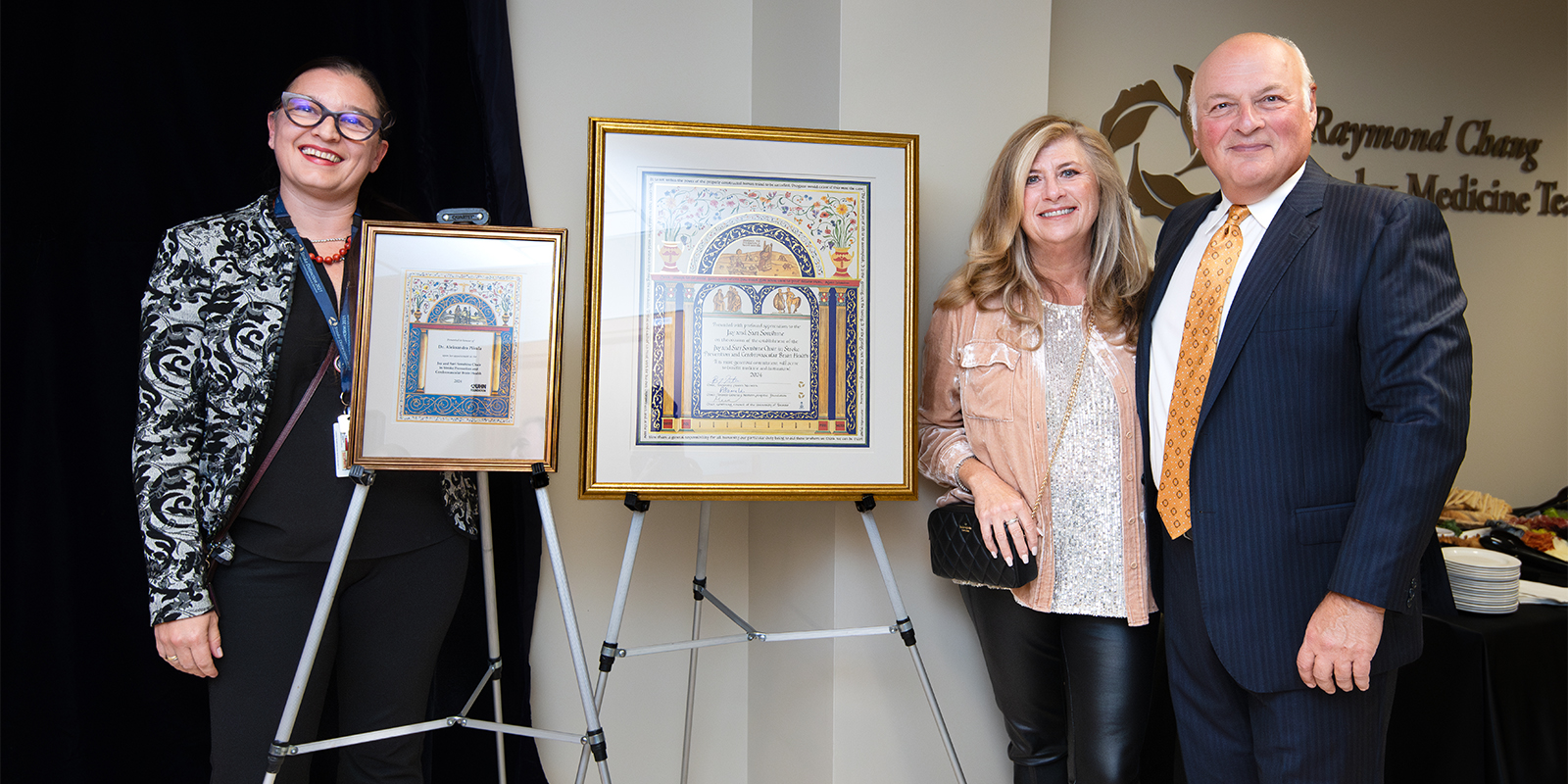
Dr. Aleksandra Pikula, the inaugural Jay and Sari Sonshine Chair in Stroke Prevention and Cerebrovascular Brain Health, with philanthropists Sari & Jay Sonshine. (Photo: Andrew Downs Photography)
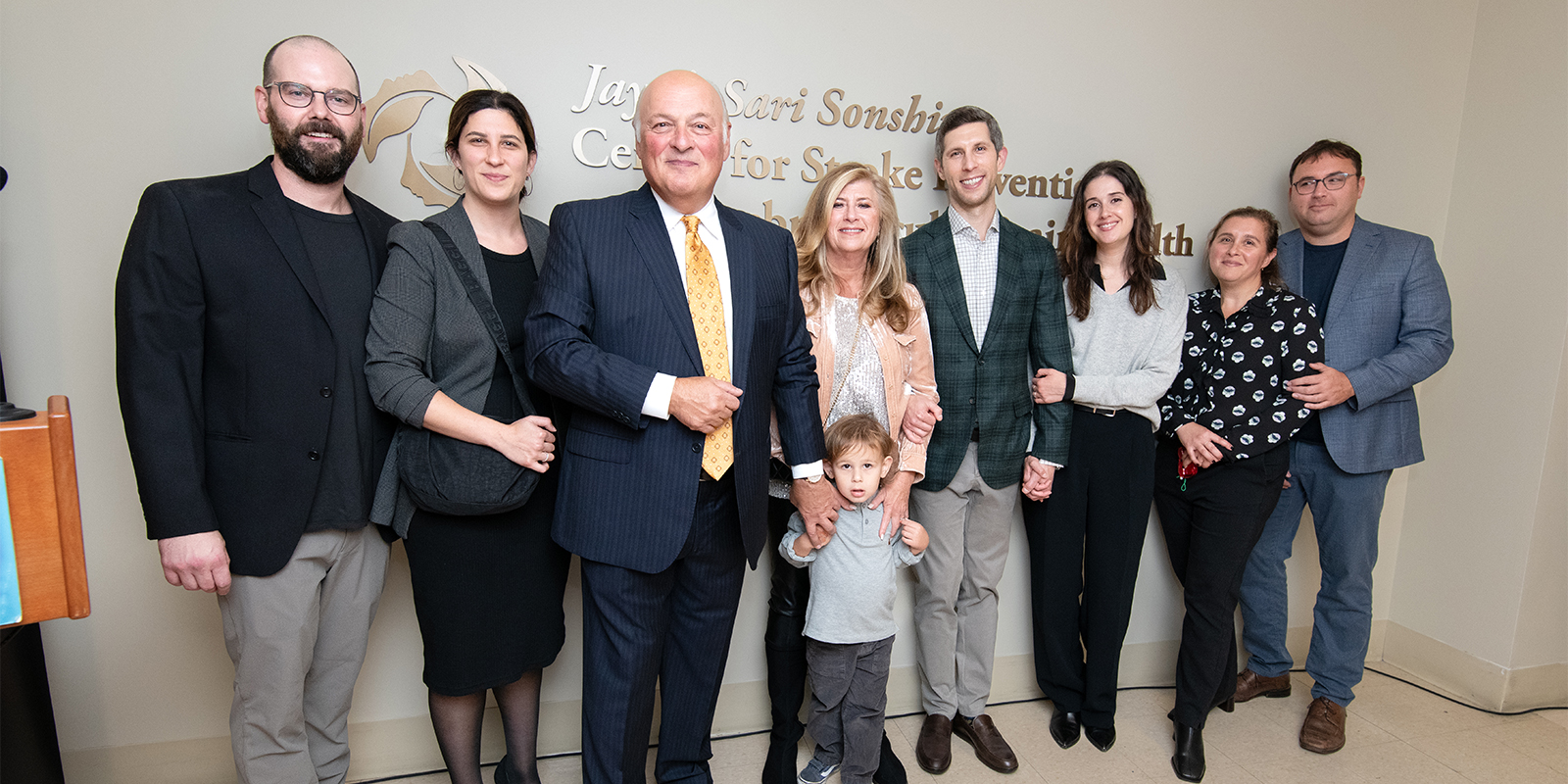
The Sonshine family (Photo: Andrew Downs Photography)
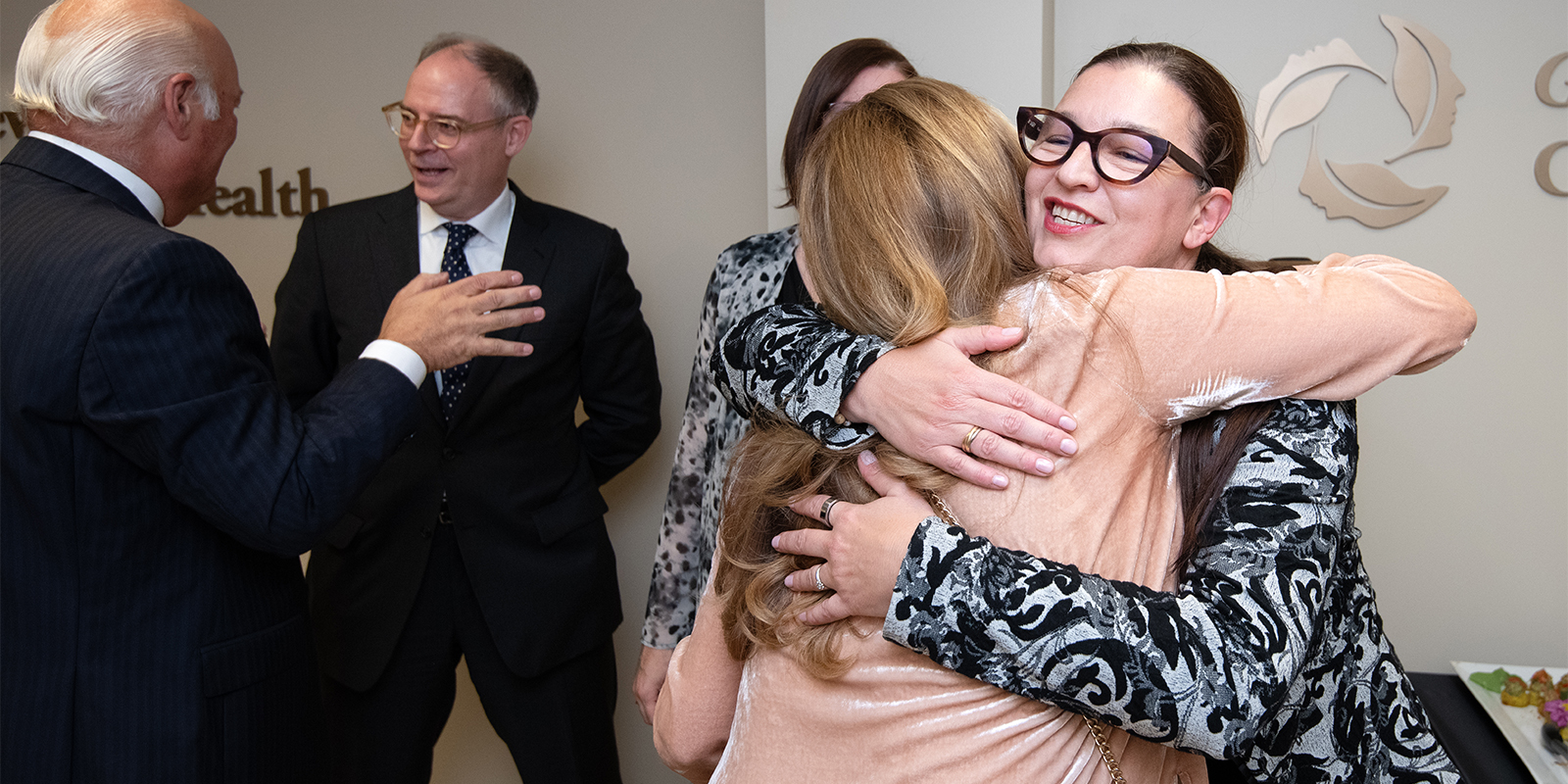
Dr. Aleksandra Pikula and Sari Sonshine (Photo: Andrew Downs Photography)
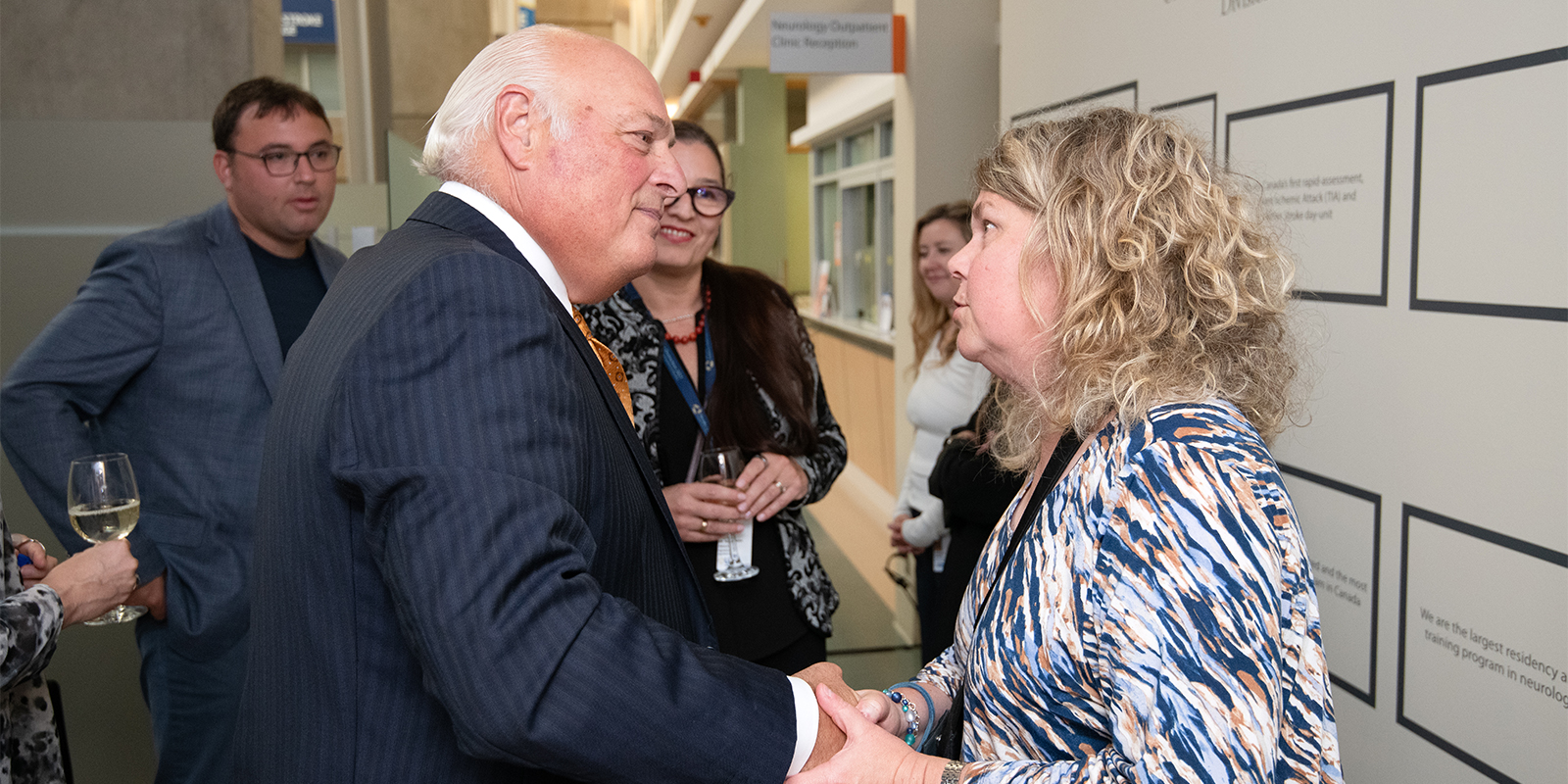
Philanthropist Jay Sonshine meets with a former stroke patient at Toronto Western Hospital (Photo: Andrew Downs Photography)
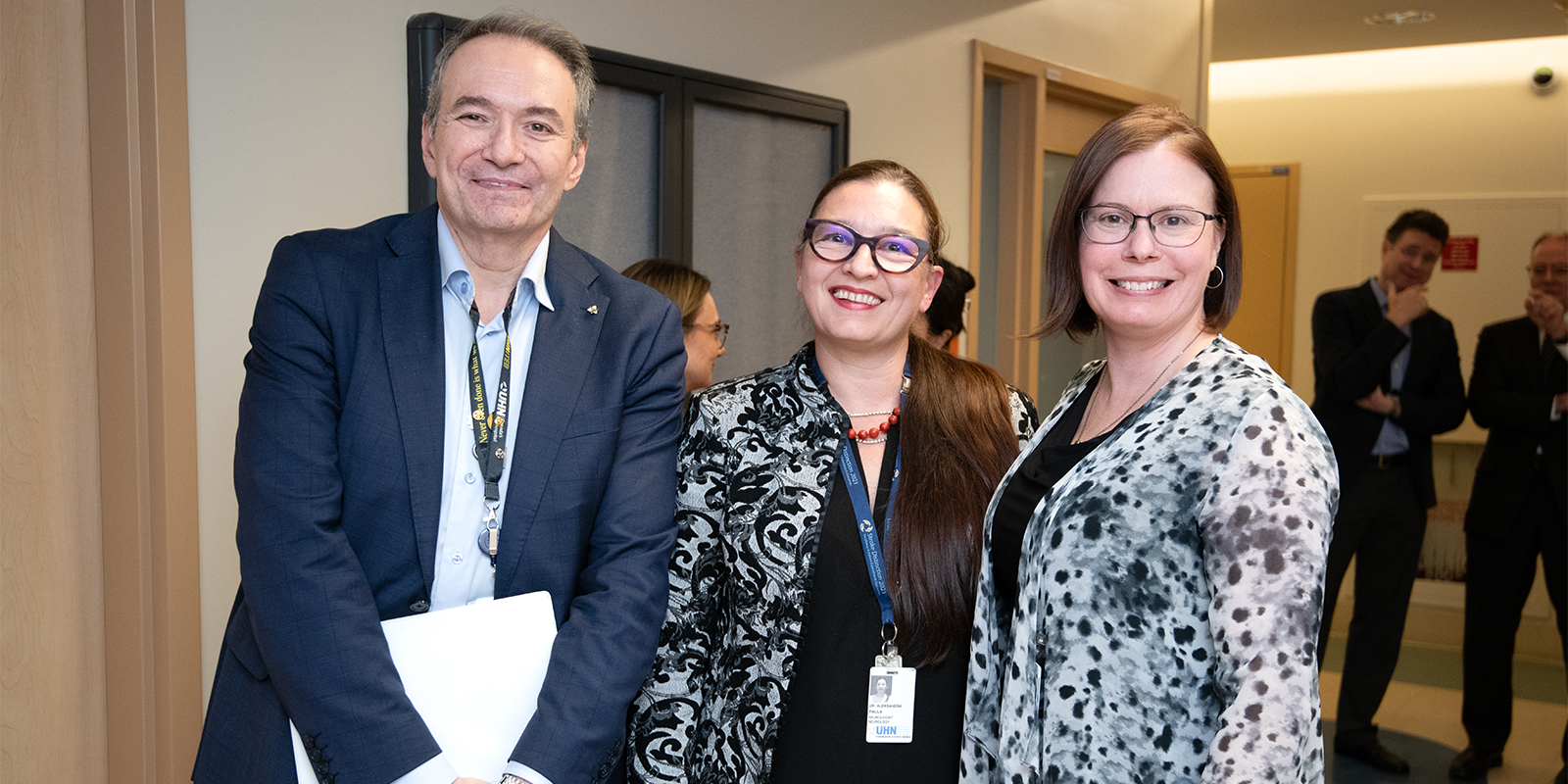
UHN CEO Kevin Smith with Dr. Aleksandra Pikula, Founding Director of the Sonshine Centre and Dr. Leanne Casaubon, Medical Director of UHN Stroke Program and Co-Founder of the Sonshine Centre (Photo: Andrew Downs Photography)
Boost Your 'Brain Care Score' to Prevent Stroke, Dementia and Depression
Simple Tool Paves the Way for a New Model of Care Focused on Wellness and Lifestyle for All
September 12, 2024
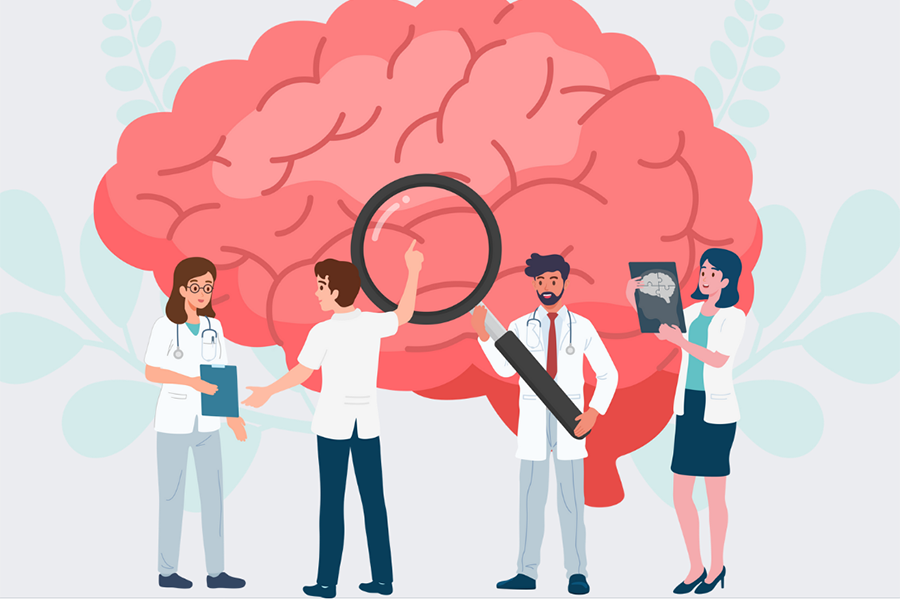 'Brain Care Score' is a tool that can help people identify modifiable risk factors for the incidence of dementia, stroke and late-life depression to work on.
'Brain Care Score' is a tool that can help people identify modifiable risk factors for the incidence of dementia, stroke and late-life depression to work on.
Imagine at your next doctor's appointment, you're being assessed for your latest 'Brain Care Score'; and instead of pills, you're being prescribed certain foods to eat (or to avoid), and are taught stress management techniques to prevent another stroke.
This is the new model of care – the SPLENDOR Care Model – being studied at the Jay & Sari Sonshine Center for Stroke Prevention and Cerebrovascular Brain Health at Toronto Western Hospital, which was inspired by the Brain Care Score developed at the McCance Centre for Brain Health, Massachusetts General Hospital.
The Brain Care Score incorporates the six pillars of Lifestyle Medicine, a branch of health care that emphasizes prevention and management of chronic conditions such as blood pressure and diabetes through improving day-to-day habits in order to prevent stroke, dementia and many other conditions.
Various studies have found that 60 per cent of the global burden of stroke, 45 per cent of dementia, and 35 per cent of late-life depression is linked to lifestyle habits and modifiable risk factors. The Brain Care Score and the newly proposed model of care will try to address that.
What's Your Brain Care Score?
Since its creation in 2022, the Brain Care Score is now being used in clinics around the world in parts of Africa, Europe and the U.S., and in both primary and secondary care settings.
It's a tool developed for healthcare providers all around the world to help their patients improve their brain care. It examines a patient's physical conditions including their blood pressure and BMI, lifestyle habits and social-emotional components. Check out your Brain Care Score.
"Numerous conversations with patients, healthcare professionals, and researchers around proactive brain care brought about the development and validation of this tool," says Dr. Sanjula Singh, faculty member at Harvard Medical School and Massachusetts General Hospital, and one of the leading scientists on the Brain Care Score.
"The Brain Care Score answers the questions: "What can I do to take better care of my brain, and thereby lowering my risk of age-related brain diseases such as stroke, dementia and late-life depression?," Dr. Singh explains during her lecture at the Jay & Sari Sonshine Center's monthly speaker series on September 12th.
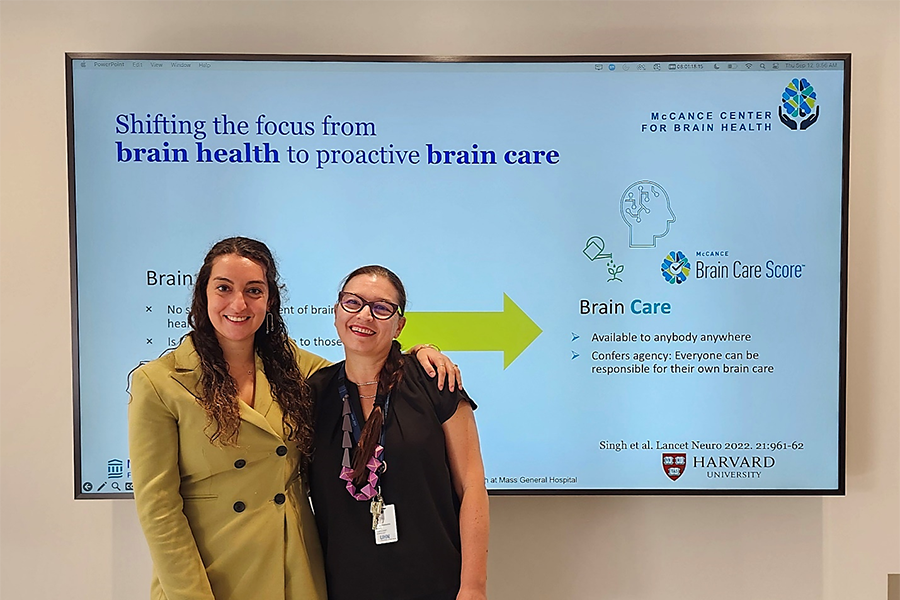 Dr. Sanjula Singh (left) with the Chair of the Jay & Sari Sonshine Center Dr. Aleksandra Pikula (right) at the Jay & Sari Sonshine Center's monthly speaker series on September 12th, 2024 (Photo Credit: Jay & Sari Sonshine Center)
Dr. Sanjula Singh (left) with the Chair of the Jay & Sari Sonshine Center Dr. Aleksandra Pikula (right) at the Jay & Sari Sonshine Center's monthly speaker series on September 12th, 2024 (Photo Credit: Jay & Sari Sonshine Center)
"Validation studies using data from the UK Biobank Cohort including 500,000 individuals aged 40-69 have shown that a 5-point increase in the total Brain Care Score of individuals under 50 years of age was associated with 59 per cent lower risk of dementia, 48 per cent lower risk of stroke and 59 per cent lower risk of late-life depression in participants aged 50 years and younger at the baseline UKB assessment."
Dr. Singh says a 5-point higher Brain Care Score is a substantial, yet achievable improvement in someone's brain care. One example of a 5-point difference in the Brain Care Score is someone lowering their alcohol consumption from four drinks per week to one drink per week and lowering your blood pressure.
Moreover, regardless of one's genetic predispositions to developing certain brain conditions, healthy behaviors can improve an individual's brain care and reduce the risks irrespective of genetics.
A New Model of Care for Stroke Patients
At the Jay & Sari Sonshine Center, the new SPLENDOR Care Model project is underway to study the implementation of a different model of care for patients who have suffered a stroke using the Brain Care Score. This new model aims to motivate patients and give them agency around their brain care and overall health.
"We're paving the path to better brain care for all, while incorporating lifestyle medicine tools and focusing on the whole person with the goal to empower individuals to live healthier lives with a sense of purpose," says Dr. Aleksandra Pikula, Founding Director at the Jay & Sari Sonshine Center and JS Sonshine Chair in Stroke Prevention and Cerebrovascular Brain Health at the UHN Krembil Brain Institute and the University of Toronto.
The group-based brain health lifestyle education clinic focusing on shared medical appointment model of care for stroke prevention will be led by a stroke neurologist or a nurse practitioner, and a certified health coach to teach participants practical ways to build healthier habits into their daily life, while being clinically followed for objective brain health outcomes.
"We're not only teaching people about the risks for stroke or dementia, but also introducing people to a variety of evidence-based lifestyle options to address these risks, while instructing them about how their attitude and taking 'time-outs' can help them stay engaged and motivated on their personal goals for better brain care," says Dr. Pikula.
Education Is the Key
New work on the Brain Care Score is focusing on the education piece of the puzzle as well: teaching patients just how to take better care of their brain by targeting lifestyle habits and staying motivated.
"As doctors and researchers, we know how hard it is to bring about behaviour changes like healthy eating and regular exercising even though people know they're important," says Dr. Singh. "We need multidisciplinary tools that not only address knowledge on the modifiability of age-related brain diseases, but that substantiate in sustained behavioral changes associated with a risk reduction for stroke, dementia, and late-life depression."
